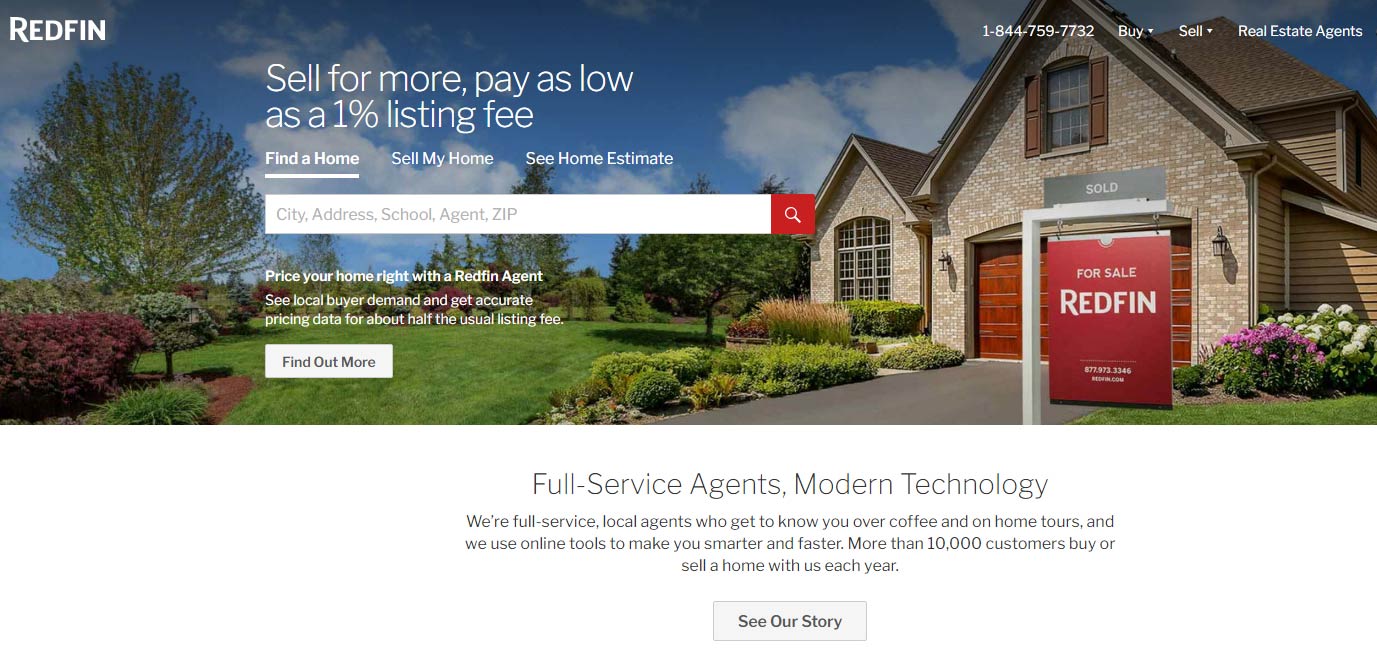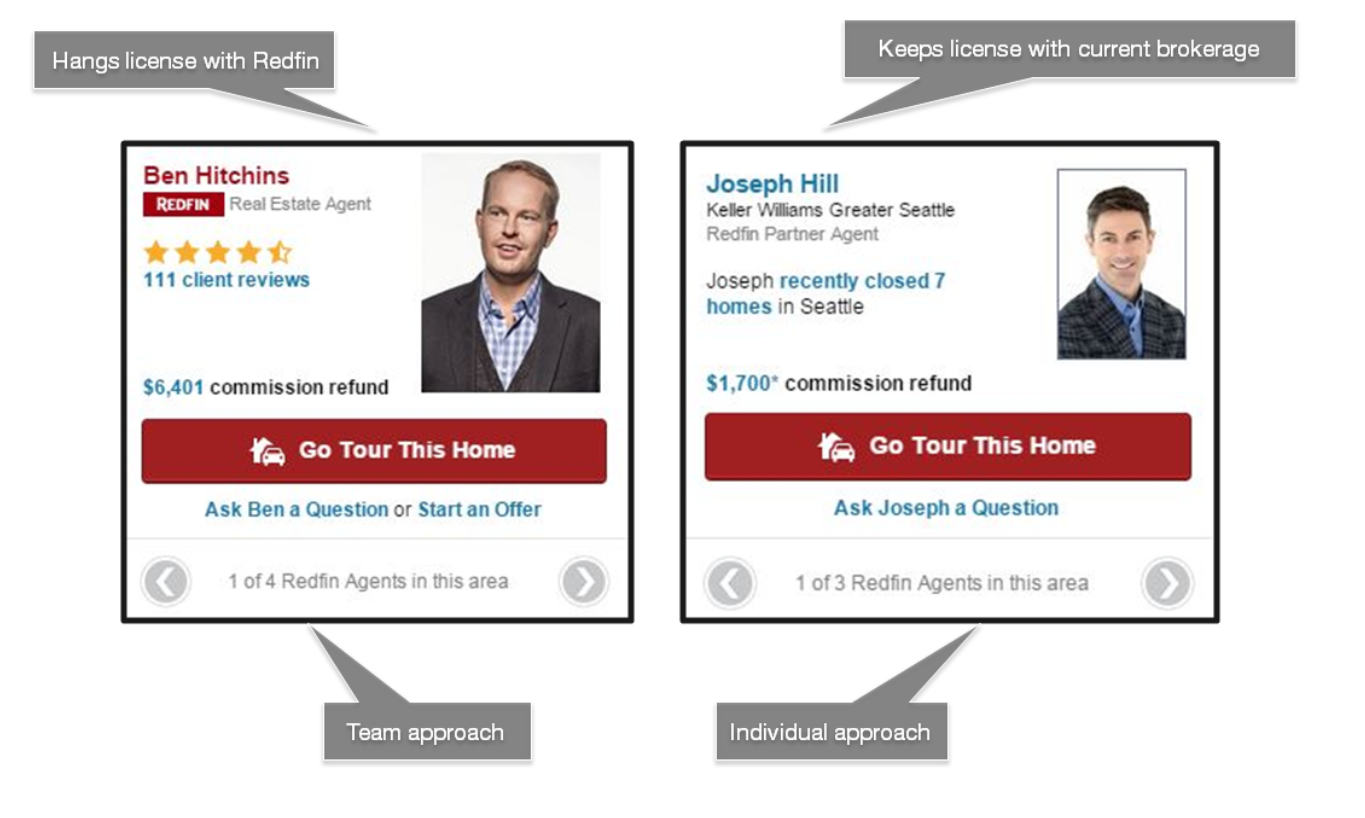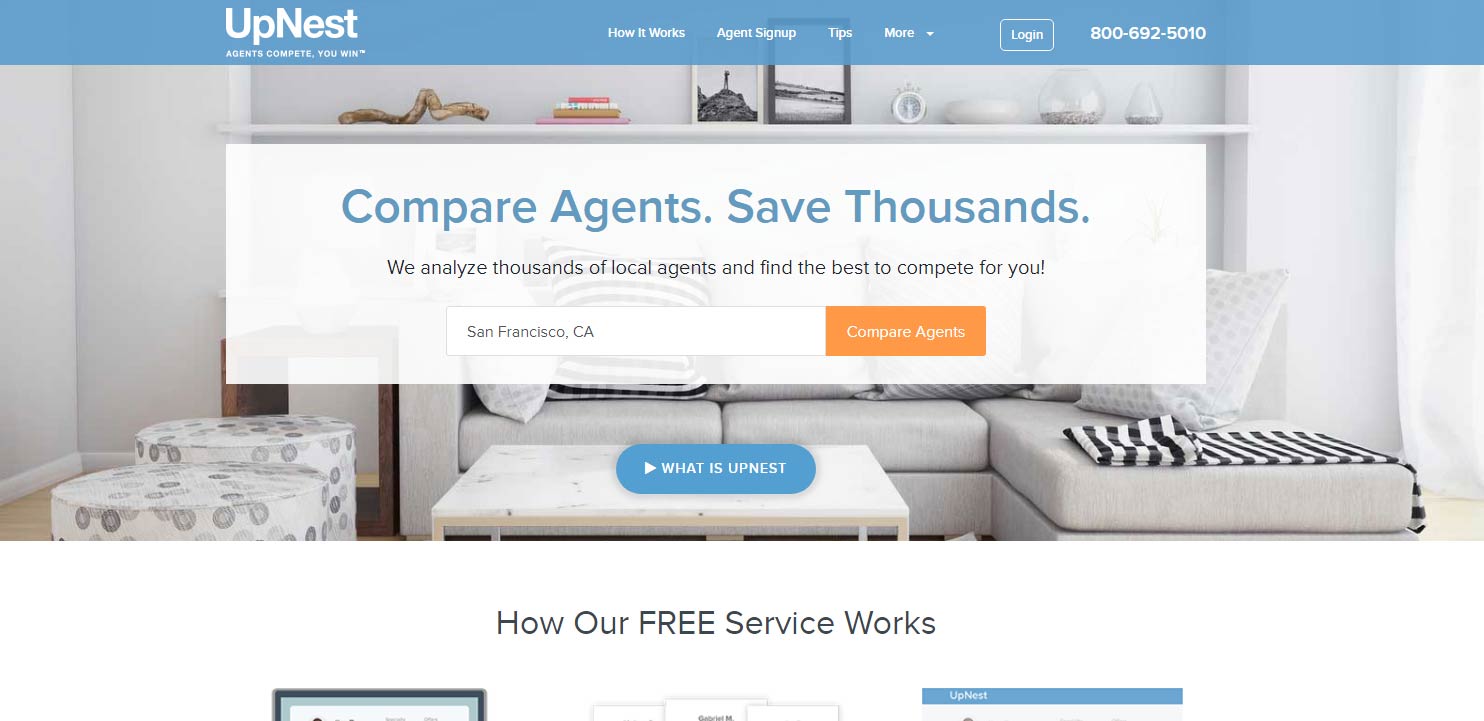Compare Redfin.com (Redfin Partner Program) and UpNest.com
For Sellers
For Sellers
For Sellers
For Buyers
For Buyers
For Buyers
Answer: Redfin.com (Redfin Partner Program) is a full-service real estate agent and a referral fee network while UpNest.com is a referral fee network that enables broker-to-broker collusion with use of blanket referral agreements
Buying and Selling with Redfin
WARNING: Unlawful Kickbacks, Broker-to-Broker Collusion, False Marketing, Wire Fraud, Price Fixing.
Redfin.com (Redfin Partner Program)) is a broker-to-broker collusion scheme, where "partner agents" unlawfully agree to pay massive kickbacks to receive your information and engage in market allocation, consumer allocation, false advertising, unlawful kickbacks, wire fraud, and price-fixing practices in violation of, inter alia, 18 U.S.C. § 1346, 18 U.S.C. § 1343, 15 U.S.C. § 1, 15 U.S.C. § 45, 12 U.S.C. § 2607, 12 C.F.R. § 1024.14. As a consumer, you will always significantly overpay for Realtor commissions subject to hidden kickbacks and pay-to-play steering promoted in this scheme.
United States federal antitrust laws prohibit consumer allocation and blanket referral agreements between real estate companies.
Be smart; do not allow your information to be "sold as a lead" to a double-dealing Realtor in exchange for massive commission kickbacks paid from your future home sale, or your future home purchase.
A multi-state broker, a full-service company rebates buyer's part of the commission it receives, where allowed, and provides listing savings to sellers. In some cases, this company acts as an Internet referral fee network where it is unable to provide real estate services.
Redfin Pricing
Redfin offers listing savings to sellers (1% to 1.5% listing fee) and commission refunds to buyers where allowed by State law (21% rebate approximate.). Redfin works with about 3,100 Partner Agents in regions where it has no direct representation in exchange for a 30% referral fees.
Listing Services
- MLS Listing
- Zillow, Trulia, etc. Listing
- Accept and Deliver All Offers and Counteroffers
- Hold Open Houses
- Professional Photography
- Professional Floor Plans
- Yard Signage Installation
- Spare Key Lock-box Installation
- Schedule Inspection Services
- Schedule Private Showings
- Closing Duties
- Home Cleaning (Optional)
- Home Painting (Optional)
- Home Staging (Optional)
- Landscaping (Optional)
Buyer's Agent Services
- Find the Property
- Accept and Deliver All Offers and Counteroffers
- Recommend Other Professionals
- Attend Inspection Services
- Schedule Private Showings
- Negotiate Needed Repairs
- Closing Duties
Redfin.com (Redfin Partner Program) Editor's Review:
Redfin is one of the largest real estate agents in the United States that offers service of a traditional agent with a competitive commission. It is important to separate Redfin services into three distinct categories: a real estate agent, a referral network and a direct cash buyer.
This review is focused on its operations as a real estate agent and a referral network. RedfinNow is further segregated into its own category because it operates as an investor and not a professional agent service model built to represent consumers.
Redfin went public in 2017 with an IPO that has raised $138 million and have thus saved consumers millions in commissions over typical rates offered by traditional real estate brokers. However, Redfin’s operations as a referral network result in an inefficiency known as reverse competition and possible price fixing. Such practice may result in lower quality of service and higher commissions due to added fees.
Agent Listings
Redfin Agents are salaried employees who are also paid bonuses based on client feedback and are not motivated by commissions. Redfin Agent Listing includes posting home on the MLS and MLS Aggregator services, professional photos, 3D tour and all typical services offered by a traditional real estate agent.
Redfin gives sellers access to a well-designed dashboard to track buyers viewing your home and other communication features.
Where Redfin cannot directly serve consumers, the company relies on a referral network of approximately 3,100 independent agents at other brokerages. Approximately 40% of all real estate transactions originated by Redfin are executed by this referral network.
Referral agents pay 30% of their commission back to Redfin when they close a transaction. Once Redfin refers a customer to a Partner Agent, that agent, not Redfin, represents the customer from the initial meeting through closing. In the past, Redfin had actively dictated that Partner Agent commission listing rates are set at 1.5%, or that Partner Agents issue rebates set at 15% to buyers (15% went to Redfin as a kickback.) Redfin has since revised this policy because it violates antitrust law.
In the United States, all independent brokerage fees are always negotiable and each real estate agent establishes its own policy for a fee structure, amount of commissions, and the sharing of any listing commissions.
Price fixing is prohibited by antitrust legislation. To fix, control, recommend, suggest or maintain commission rates or fees for other agents' services is an improper practice. Redfin Corporation has recently stopped such blatant price fixing strategy, where a statement on the company’s website now reads: "Since Partner Agents aren't employed by Redfin, we can't guarantee our 1%–1.5% listing fee or offer a Redfin Refund for customers who work with a Partner Agent." This statement means not only that Redfin "can't guarantee" these savings, but also that consumers shouldn't expect to receive savings from a Partner Agent.
Redfin still heavily engages in market-allocation and consumer brokering practices in their efforts to earn referral fees, instead of actually providing representation services. In 2019 Redfin has made a massive move by allowing with RE/MAX brokerage to participate as Partner Agents, where consumers are "sold as leads" to RE/MAX brokers for 25% cut of their commission.
Consumers a highly likely to overpay for listing commissions and receive little or no refund using Redfin Partner Program, when buying or selling a home, because the added 30% referral fee makes it impossible for Partner Agents to negotiate a fair market rate.
By utilizing Partner Agents, consumers are not just getting nothing, but are being subjected to thousands and sometimes tens of thousands in useless fees paid for the privilege of getting connected to a random agent.
Redfin Partner Program is one of the worst consumer brokering programs in the market because it implies that consumers will get a lower listing rate, or a refund from the Partner Agent shown on the Redfin website, but due to price fixing antitrust law this is not true.
Consumers should absolutely avoid using Redfin Partner Program agents.
Concierge Service
In November 2017 Redfin has launched a program called Concierge Service in select areas that offer home sellers added benefits of coordinating, supervising and paying for services such as deep cleaning, painting, staging, and landscaping in exchange for a 2% listing fee.
Where does Redfin.com (Redfin Partner Program) operate?
Buying and Selling with UpNest
WARNING: Unlawful Kickbacks, Broker-to-Broker Collusion, False Marketing, Wire Fraud, Price Fixing.
UpNest.com) is a broker-to-broker collusion scheme, where "partner agents" unlawfully agree to pay massive kickbacks to receive your information and engage in market allocation, consumer allocation, false advertising, unlawful kickbacks, wire fraud, and price-fixing practices in violation of, inter alia, 18 U.S.C. § 1346, 18 U.S.C. § 1343, 15 U.S.C. § 1, 15 U.S.C. § 45, 12 U.S.C. § 2607, 12 C.F.R. § 1024.14. As a consumer, you will always significantly overpay for Realtor commissions subject to hidden kickbacks and pay-to-play steering promoted in this scheme.
United States federal antitrust laws prohibit consumer allocation and blanket referral agreements between real estate companies.
Be smart; do not allow your information to be "sold as a lead" to a double-dealing Realtor in exchange for massive commission kickbacks paid from your future home sale, or your future home purchase.
UpNest works as a referral fee network that collects pricing and services data from a limited pool of Referred Agents and sends it to consumers as non-binding proposals. UpNest operates as a licensed real estate brokerage in California under BRE License # 01928572, but it does not produce any services that are typically offered by real estate agents and does not represent consumers when buying or selling real estate in any State.
When consumers submit information to UpNest, this information is simply sold to real estate agents who are willing to pay for it with a 30% share of their commission. If an Agent does not want to pay a referral fee, the consumer will not see any proposals from them using the UpNest platform.
UpNest claims to provide savings, but consumers are likely to overpay for their Referred Agent's commission due to added mandatory 30% referral fee.
UpNest Pricing
UpNest revenue comes from referral fees and sale of user data.
Listing Services
- This Service Does Not Represent Sellers
Buyer's Agent Services
- This Service Does Not Represent Buyers
UpNest.com Editor's Review:
UpNest is a referral fee network in business to collect fees for matching brokers with consumers. Referral fees are highly disadvantageous for real estate consumers because these are hidden and not negotiated. One of the major expenses for real estate consumers, when buying or selling a home, is real estate service fees and closing costs associated with the purchase, or sale.
Service fees and closing costs are, for the most part, a necessary expense. Real estate agents significantly help home buyers and sellers to navigate a complicated and competitive real estate process in exchange for a legitimate commission as a reward. Other closing fees usually include required services such as property appraisals, inspections, title insurance, etc. – all in some way help to legitimize the sale and to manage risk. There can be much said with regards to managing closing costs by choosing a motivated competitive agent who is willing to offer a buyer’s refund or a competitive listing rate.
On the other hand, while claiming it saves money to consumers, UpNest simply adds referral fees into already a fee-ridden process – consumers experience false and fabricated savings in this model. In economics, this process is known as reverse competition.
The platform works with a limited pool of Referral Agents willing to pay a very significant part of their commission to UpNest. This referral fee is back-loaded into Referred Agent's agreement, instead of being handed to the consumer directly. The consumer technically does not pay UpNest, but he/she ends up with a higher cost of commissions when working with their Referred Agent. UpNest is not a free platform, these fees are simply hidden.
Let's say a real estate consumer, James, wants to hire a buyer’s agent in one of the States that allow buyer's rebates when buying a median-priced home for $250,000. A local competitive buyer’s agent, Jill, offers James a 50% buyer's refund while helping him in this process. This is a typical refund Jill is able to organically negotiate with all her customers. The estimated commission refund, in this case, is $3,750 paid back to James from Jill in a form of buyer's refund, assuming a 3% Buyer’s Agent Commission.
On the other hand, James also receives non-binding proposals using UpNest platform from Referred Agents with a 30% referral fee attached to the back of every proposal. When James is faced with these types of proposals, results are quite different. Firmly assuming that the profit margins and service offerings remain the same for Jill and Referral Agents using UpNest, any possible buyer's refund offered by Referral Agents must be reduced to account for the UpNest referral fees. The referral fee in this scenario estimated at $1,125 due to UpNest from a Referral Agent. With the profit margin fixed, the estimated commission refund a Referral Agent may offer to James is now only $2,625.
James just effectively “paid” UpNest $1,125 for a service that is supposed to be “free”.
One reason the amount of savings may ever be matched by Referred Agents versus Jill's competitive savings is due to broker-to-broker pricing collusion - if Referral Agent is willing to reduce their fee beyond market rates to compensate UpNest out of their own pocket, which is highly unlikely and unreasonable to assume.
Because referral fees are pre-set between UpNest and Referral Agents in advance, the cost of the referral has to be eventually be paid by the real estate consumer.
The reason we give UpNest a low score is due to exigent fees and the way these fees are structured. UpNest plays down fees to consumers, it states directly that the service is 100% free, but then it rigidly locks every Referred Agent into an added cost. The vast majority of competitive agents refuse to play this game and UpNest simply steers consumers toward a limited pay-to-play network. As a licensed real estate agent that doesn't perform any real estate services, or takes any responsibility for the transaction, it's not entirely clear how this process works under the Business and Professions Code.
Should real estate agents distribute "bids" of other agents for a fee? If one to say that the 30% fee is indeed necessary, why not structure it as an actual service fee that is properly charged, instead of having to be back-loaded into Referral Agent's agreement? The answer is simple – if UpNest was to charge Agents for its service directly, no Agent would ever sign-up. Agents only sign-up with UpNest because the price of the referral fee can be easily incorporated into their client's agreement.
UpNest clearly doesn't provide any tangible value to the real estate consumers as a licensed real estate agent. UpNest further audits all transactions because it needs to find out how much money real estate agents receive in commissions, inevitably collecting private details of consumer’s agreement for home purchase or sale.
This effect is known as a “blind” match. Truly competitive agents who offer great savings to consumers can never use UpNest. For example, a highly competitive flat fee listing service has a set competitive price – they would never be able to pay 30% of this amount to a third-party. UpNest 30% referral fee only works is with services who are “silent” on their commission – if a client comes directly to an agent, one price is given, if a client uses UpNest, another price is in play. We strongly believe that real estate consumers looking to buy or sell a home should always use 0% referral fee platforms in order to avoid paying a higher cost in commissions.
By using UpNest, consumers further encourage pay-to-play referral fee bias to thrive in a broken real estate industry.




